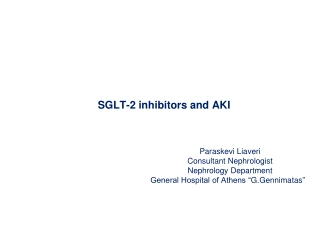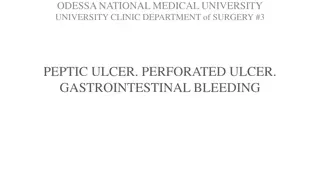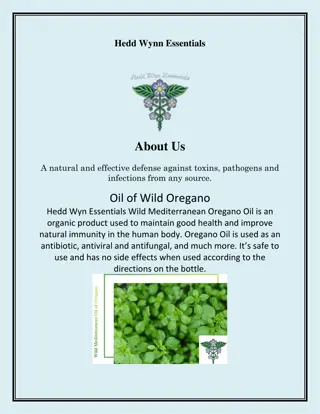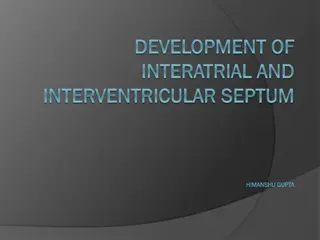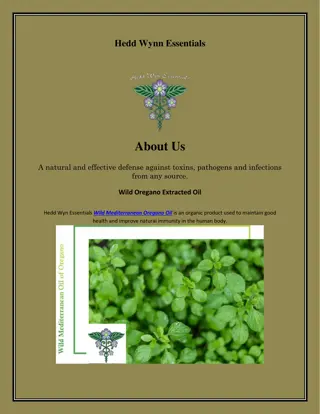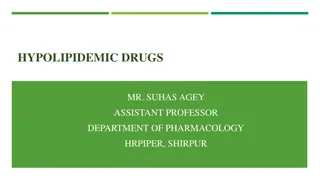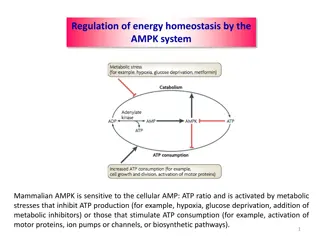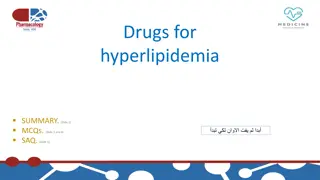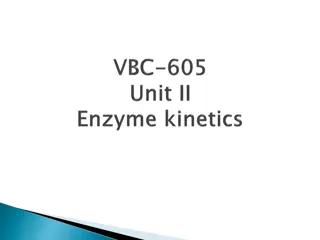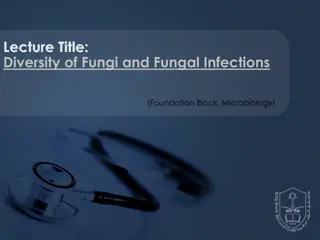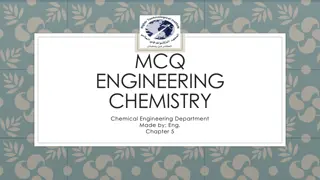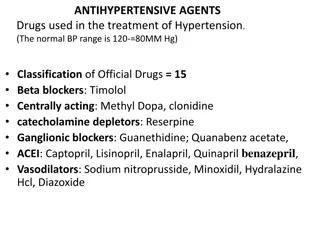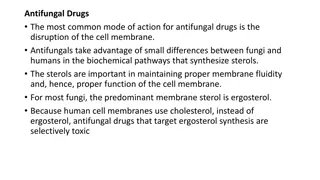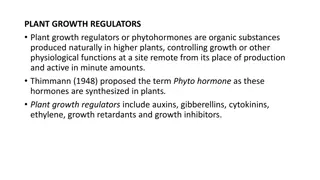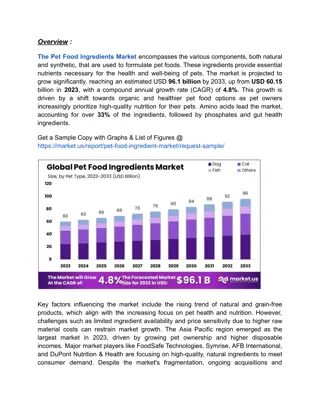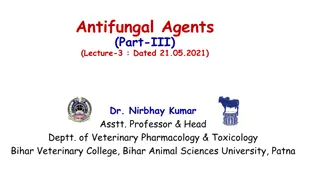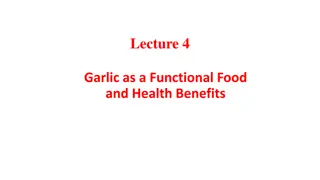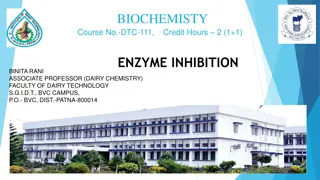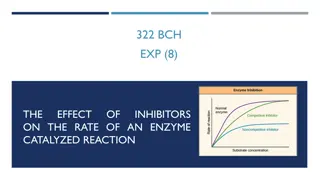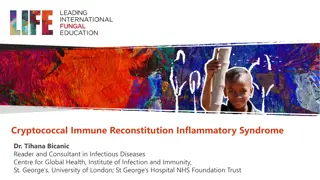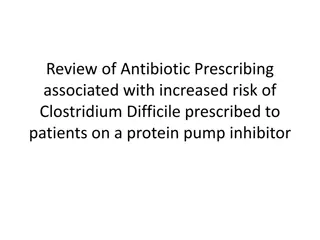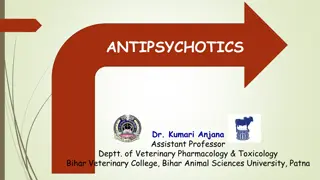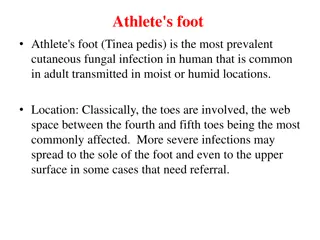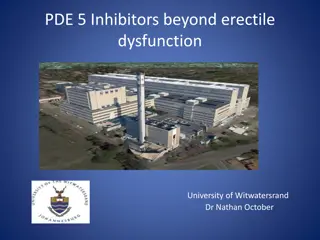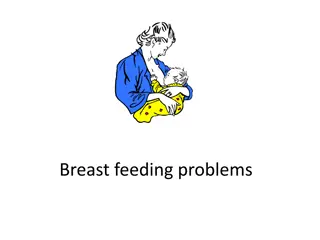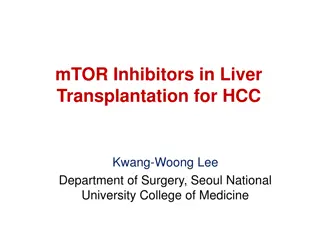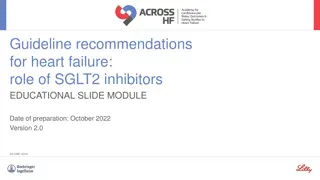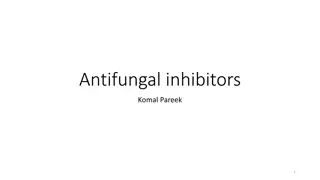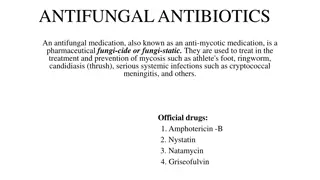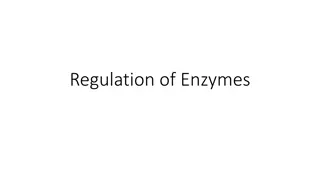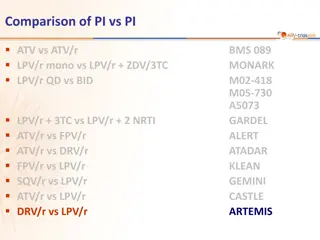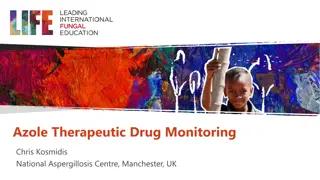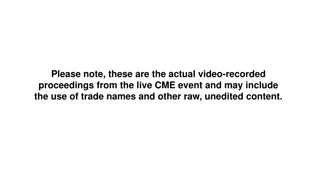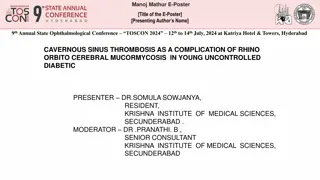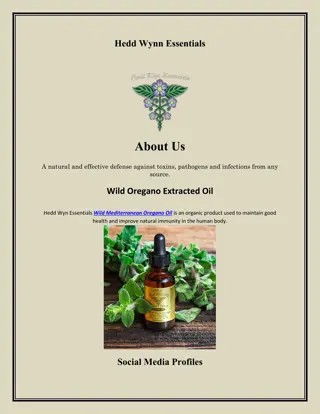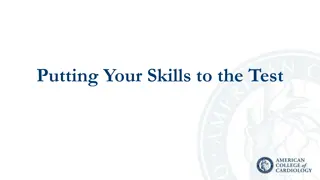SGLT-2 inhibitors and AKI
Consultant Nephrologist Paraskevi Liaveri discusses the association between SGLT-2 inhibitors and acute kidney injury (AKI). Pharmacovigilance reports highlight a higher risk of AKI with these drugs, especially when combined with RAAS blockers, diuretics, or NSAIDs. Studies suggest potential mechani
0 views • 49 slides
Understanding Peptic Ulcer Disease: Causes, Symptoms, and Treatment
Peptic ulcer disease (PUD) involves ulcerations in the duodenal or gastric mucosa caused by factors like Helicobacter pylori infection and NSAID use. Symptoms include abdominal pain and nausea, and treatment often involves H. pylori eradication and proton pump inhibitors to prevent complications lik
1 views • 77 slides
Wild Oregano Oil, wildoiloforegano.com
Oregano Oil is used as an antibiotic, antiviral and antifungal, and much more. http:\/\/wildoiloforegano.com\/
0 views • 2 slides
DEVELOPMENT OF INTERATRIAL AND INTERVENTRICULAR SEPTUM
Human heart development begins in the 3rd week of gestation with the formation of heart tubes that eventually differentiate into various cardiac structures. The heart undergoes folding and septation processes during development, leading to the formation of crucial septa. Molecular regulation, involv
3 views • 62 slides
Wild Oregano Oil, wildoiloforegano.com
Oregano Oil is used as an antibiotic, antiviral and antifungal, and much more. http:\/\/wildoiloforegano.com\/
2 views • 2 slides
HYPOLIPIDEMIC DRUGS
Major lipids like cholesterol and triglycerides play essential roles in the body, but their excess can lead to hyperlipidemia and related conditions. This overview covers the biosynthesis of cholesterol, triglycerides, and the transport of lipids in the bloodstream, discussing the importance of lipo
1 views • 30 slides
Regulation of Energy Homeostasis by AMPK System and Its Modulation Factors
The AMPK system plays a crucial role in regulating energy homeostasis by sensing the cellular AMP:ATP ratio and responding to metabolic stresses that affect ATP production or consumption. AMPK is activated by factors such as hypoxia, glucose deprivation, and metabolic inhibitors, as well as by compo
0 views • 27 slides
Understanding COX Enzymes and Their Impact on Pain and Inflammation
COX enzymes, including COX1, COX2, and COX3, play a crucial role in synthesizing prostanoids like prostaglandins in the body, affecting pain and inflammation. By inhibiting these enzymes, relief from pain and inflammation can be achieved. However, non-selective COX inhibitors may lead to various sid
0 views • 21 slides
Drugs for Hyperlipidemia Summary and Quiz MCQs
This presentation covers drugs for hyperlipidemia, including bile acid sequestrants, cholesterol absorption inhibitors, statins, fibrates, and relevant drug interactions. It details the actions, adverse effects, contraindications, and notable considerations for each drug class. The included multiple
0 views • 6 slides
Factors Affecting Enzyme Activity and Catalysis
Enzyme activity is influenced by various factors such as enzyme concentration, temperature, pH, substrate concentration, inhibitors, activators, and physical agents. The rate of enzyme-catalyzed reactions is directly proportional to enzyme concentration, and temperature plays a significant role with
0 views • 23 slides
Understanding Fungi Diversity and Infections in Microbiology
Explore the world of fungi and fungal infections in this foundation block of microbiology. Learn about medically important yeasts, mold fungi, major fungal diseases, antifungal agents, and infection acquisition methods. Dive into hypersensitivity reactions, mycotoxicoses, and various types of fungal
1 views • 19 slides
Corrosion Prevention Methods in Chemical Engineering
Define oxidation, reduction, oxidizing agent, reducing agent, standard electrode potential, Nernst equation, and corrosion in the context of chemical engineering. Discuss different forms of corrosion, including uniform corrosion, galvanic corrosion, pitting corrosion, and stress corrosion. Explore m
0 views • 20 slides
Overview of Antihypertensive Agents and their Mechanisms of Action
Explore the classification of antihypertensive agents used in treating hypertension, including beta blockers, centrally acting agents, ganglionic blockers, ACE inhibitors, vasodilators, and more. Learn about the Renin-Angiotensin System, ACE inhibitors, and specific drugs like Captopril and Benazepr
0 views • 9 slides
Understanding Antifungal Drugs: Modes of Action and Applications
Antifungal drugs target ergosterol biosynthesis in fungi, disrupting cell membrane integrity. Imidazoles like miconazole and ketoconazole are commonly used for skin infections, while triazoles such as fluconazole treat systemic yeast infections. Allylamines inhibit ergosterol synthesis, with terbina
0 views • 13 slides
Understanding Plant Growth Regulators: Phytohormones and Their Functions
Plant growth regulators, also known as phytohormones, are organic compounds produced naturally in plants to control growth and physiological functions. They include auxins, gibberellins, cytokinins, ethylene, growth regulators, and inhibitors. Auxins, for example, promote growth along the plant's lo
2 views • 28 slides
Innovations in Pet Food Ingredients Focus on Enhanced Palatability
Pet Food Ingredients Market By Pet (Dog, Cat, Fish, and Others), By Ingredients (Specialty Proteins, Amino Acids, Mold Inhibitors, Gut Health Ingredients, Phosphates, Vitamins, Acidifiers, Carotenoids, Enzymes, Mycotoxin Detoxifiers, Flavors & Sweete
1 views • 4 slides
Understanding Lubricants in Engineering Chemistry
Lubricants are substances introduced between moving surfaces to reduce friction, heat generation, and wear and tear of machine parts. They act as thermal barriers, coolants, seals, and corrosion inhibitors. Good lubricating oils have high boiling points, adequate viscosity, and non-corrosive propert
1 views • 25 slides
Understanding Azole Antifungal Agents for Veterinary Use
Azole antifungal agents play a crucial role in treating fungal infections in veterinary medicine. Imidazoles like clotrimazole and triazoles like fluconazole are commonly used for their fungistatic properties. These agents inhibit fungal enzymes, disrupting membrane fluidity and inhibiting cell repl
0 views • 14 slides
Garlic: A Functional Food with Diverse Health Benefits
Garlic, a potent functional food, contains essential chemical ingredients like alliin that offer numerous health benefits. Its antioxidant and anti-inflammatory properties aid in protecting the cardiovascular system by inhibiting cholesterol synthesis and platelet aggregation. Additionally, garlic d
0 views • 14 slides
Understanding Enzyme Inhibition in Biochemistry
Enzyme inhibition plays a crucial role in pharmacology and biochemistry by regulating enzymatic reactions. Inhibitors can be reversible or irreversible, affecting enzyme activity differently. Competitive, uncompetitive, and noncompetitive inhibition types are explained along with examples like diiso
0 views • 20 slides
Understanding Enzyme Inhibition in Acid Phosphatase Kinetics
In this experiment, the effect of inhibitors on enzymatic reactions, specifically acid phosphatase, is explored. Different types of inhibition (competitive, noncompetitive, uncompetitive) are examined, along with reversible and irreversible inhibitors. The study aims to determine the type of inhibit
1 views • 17 slides
Understanding Cryptococcal Immune Reconstitution Inflammatory Syndrome
Cryptococcal Immune Reconstitution Inflammatory Syndrome (C-IRIS) is a condition where rapid reversal of immunodeficiency triggers exaggerated inflammatory reactions in response to Cryptococcus antigens. It can manifest as either Unmasking IRIS or Paradoxical IRIS, with common CNS presentations incl
0 views • 10 slides
Antibiotic Prescribing Impact on Clostridium Difficile Risk in Patients on Protein Pump Inhibitors
Antibiotic prescribing in patients on protein pump inhibitors (PPIs) is associated with an increased risk of Clostridium difficile infection. A review was conducted on high-risk antibiotic prescriptions, revealing instances where patients were prescribed against guidelines, leading to potential comp
0 views • 5 slides
Understanding Antipsychotics and Antidepressants in Veterinary Pharmacology
Antipsychotics and antidepressants play crucial roles in treating psychological and affective disorders in veterinary medicine. Antidepressants are vital in managing abnormal mood and behavior linked to depression, while antipsychotics help address various nervous disorders. The classification of an
0 views • 11 slides
Optimizing Foundational Treatments for HFrEF: Guideline Recommendations and Implementation Strategies
Highlighting the current guideline recommendations for treating patients with Heart Failure with Reduced Ejection Fraction (HFrEF), this educational slide module emphasizes the importance of implementing the recommended therapies effectively. It covers the foundational treatments recommended by vari
0 views • 28 slides
Understanding Dormancy in Plants: Causes and Implications
Dormancy in plants, involving seeds and buds, is a state where growth is temporarily halted due to internal or external factors. Factors like immature embryos, impermeable seed coats, and growth inhibitors contribute to seed dormancy. The presence of inhibitors like abscisic acid and the influence o
0 views • 43 slides
Understanding Athlete's Foot: Symptoms, Prevention, and Management
Athlete's foot, a common fungal infection, primarily affects the toes and can spread to the sole of the foot. Symptoms include white, itchy skin with a sogginess and odor. Severe cases with broken skin and signs of bacterial infection require referral. Prevention involves practicing good hygiene, ch
0 views • 12 slides
Exploring the Diverse Applications of PDE-5 Inhibitors Beyond Erectile Dysfunction
Discover how PDE-5 inhibitors go beyond treating erectile dysfunction, with approved and emerging compounds, alternative dose regimens, concentration sites, and potential targets like cardiovascular diseases and the central nervous system.
0 views • 47 slides
Breastfeeding Common Problems and Solutions
Breastfeeding can present various challenges such as latching issues, cracked nipples, engorgement, mastitis, low milk supply, thrush, and inverted nipples. Effective strategies include proper positioning, soothing gel pads, hand-expressing milk, antibiotics, frequent nursing, antifungal treatment,
0 views • 9 slides
mTOR Inhibitors in Liver Transplantation for HCC: Recent Updates and Clinical Trials
Exploring the use of mTOR inhibitors in liver transplantation for hepatocellular carcinoma (HCC), this content presents recent study results and experiences from the Korean population. It discusses the preventive potential of mTOR inhibitors in HCC recurrence based on previous studies and the need f
0 views • 32 slides
Guideline Recommendations for SGLT2 Inhibitors in Heart Failure
This educational slide module provides an overview of the guideline recommendations for SGLT2 inhibitors in the treatment of heart failure, including HFrEF, HFmrEF, and HFpEF. It covers recommendations from AHA, ACC, HFSA, ESC, CCS, and CHFS guidelines, highlighting the role of SGLT2 inhibitors as a
0 views • 28 slides
Understanding Antifungal Inhibitors and Drugs
In this detailed overview, we explore antifungal inhibitors and drugs, including their mechanisms of action, impact on eukaryotes and prokaryotes, common agents affecting fungal sterols and cell walls, as well as synthetic antifungals. From polyenes like nystatin to azoles such as voriconazole, this
0 views • 12 slides
Overview of Antifungal Antibiotics and Their Uses
Antifungal antibiotics are crucial medications used to treat and prevent various fungal infections such as athlete's foot, ringworm, candidiasis, and systemic infections like cryptococcal meningitis. This article discusses key antifungal medications including Amphotericin-B, Nystatin, Natamycin, and
0 views • 6 slides
Understanding Enzyme Regulation and Factors Affecting Enzyme Activity
Organisms carefully control enzyme production and activation as per varying needs and conditions within cells. Enzyme activity is influenced by factors such as pH, temperature, regulatory molecules, cofactors, compartmentalization, covalent modification, and feedback inhibition. Enzymes can be regul
0 views • 20 slides
Comparison of Protease Inhibitors in ARTEMIS Study
This study compares the efficacy and safety of different protease inhibitors (PIs) including ATV, ATV/r, LPV/r, FPV/r, DRV/r, and SQV/r in HIV treatment. The ARTEMIS study specifically focuses on comparing DRV/r and LPV/r in combination with TDF/FTC in ARV-naive patients. Results show non-inferiorit
0 views • 12 slides
Understanding Azole Therapeutic Drug Monitoring for Antifungal Therapy
Azole therapeutic drug monitoring (TDM) is crucial for managing antifungal therapy due to factors like drug interactions, compliance issues, disease severity, and pharmacokinetic variability. This monitoring helps ensure optimal drug levels are maintained for effective treatment. Different TDM metho
0 views • 18 slides
Therapies and Strategies for ER-Positive, HER2-Negative Metastatic Breast Cancer
Explore the selection and sequence of therapy for ER-positive, HER2-negative metastatic breast cancer, along with novel agents and strategies under evaluation. Learn about cases of postmenopausal women with metastatic breast cancer, CDK4/6 inhibitors, and the impact of targeted therapies on patient
0 views • 23 slides
Cavernous Sinus Thrombosis Complication in Young Diabetic - Case Study from TOSCON 2024
Cavernous sinus thrombosis is a severe complication of rhino-orbito-cerebral mucormycosis in a young uncontrolled diabetic patient presented at the 9th Annual State Ophthalmological Conference (TOSCON) 2024. The case involves a 30-year-old male with diabetes, experiencing headache, fever, and rapid
0 views • 6 slides
Oil of Wild Oregano, wildoiloforegano.com
Oregano Oil is used as an antibiotic, antiviral and antifungal, and much more. It\u2019s safe to use and has no side effects when used according to the directions on the bottle. http:\/\/wildoiloforegano.com\/
2 views • 2 slides
Understanding PCSK9 Inhibitors for Cardiovascular Health
PCSK9 inhibitors are a novel class of medications that help lower LDL cholesterol levels, reducing the risk of cardiovascular events. This article covers their mechanism of action, patient groups benefiting from them, efficacy in LDL-C lowering, and safety considerations. Learn how PCSK9 inhibitors
0 views • 8 slides
